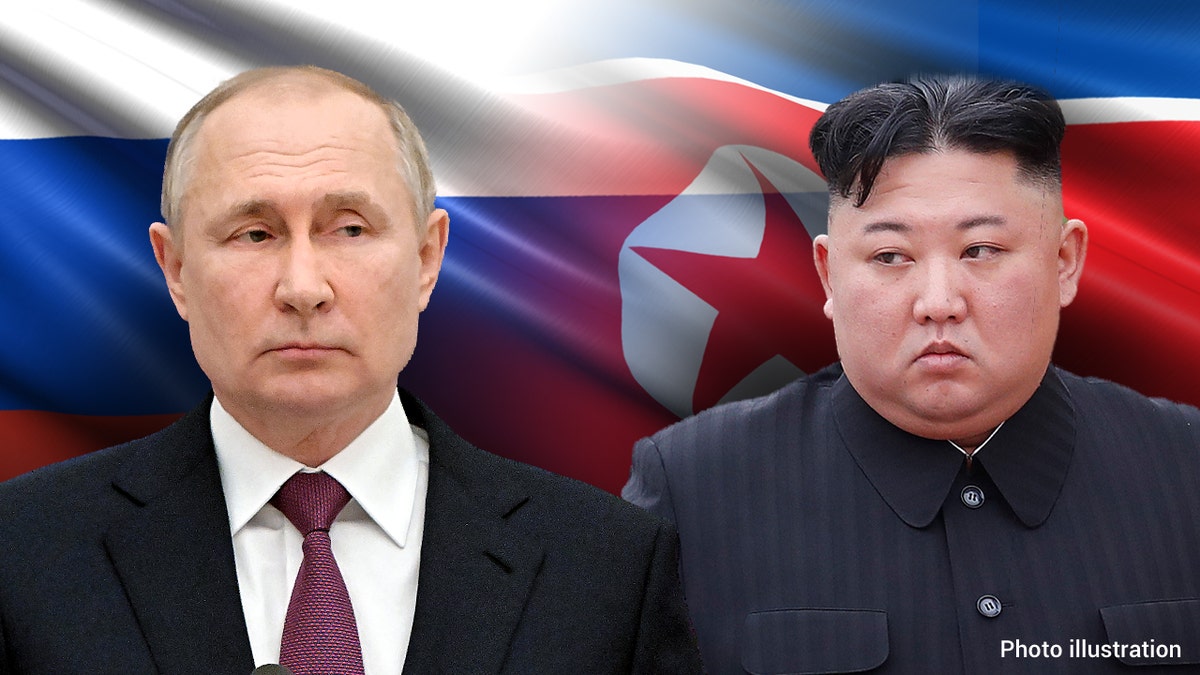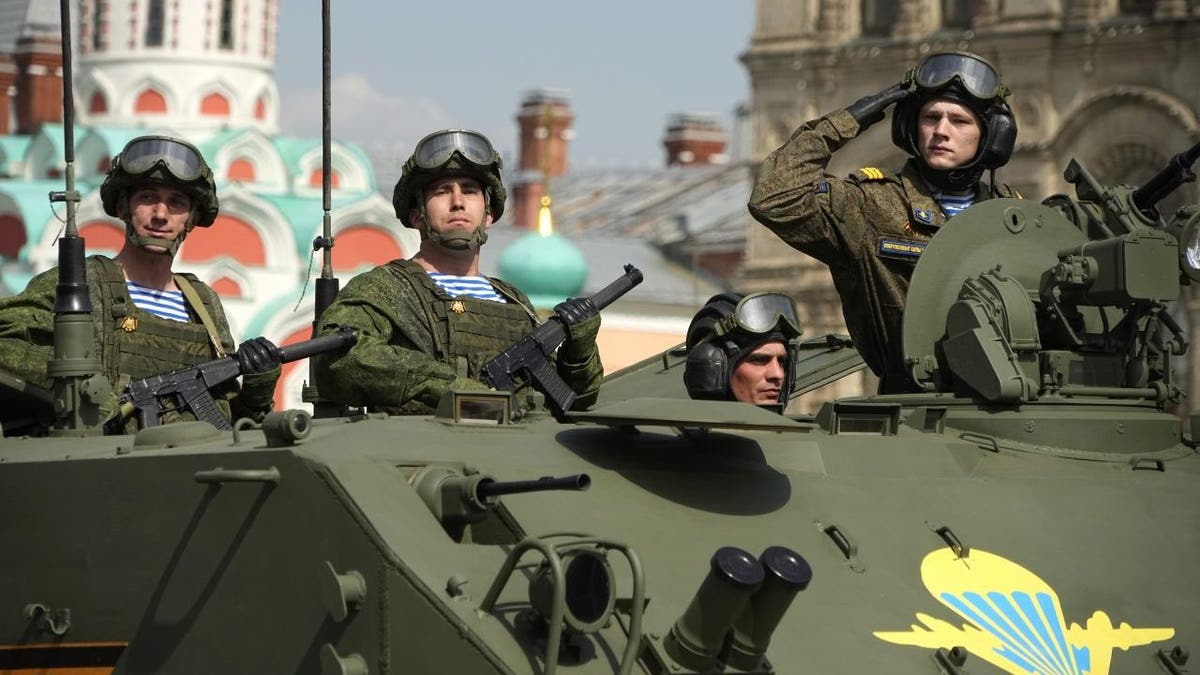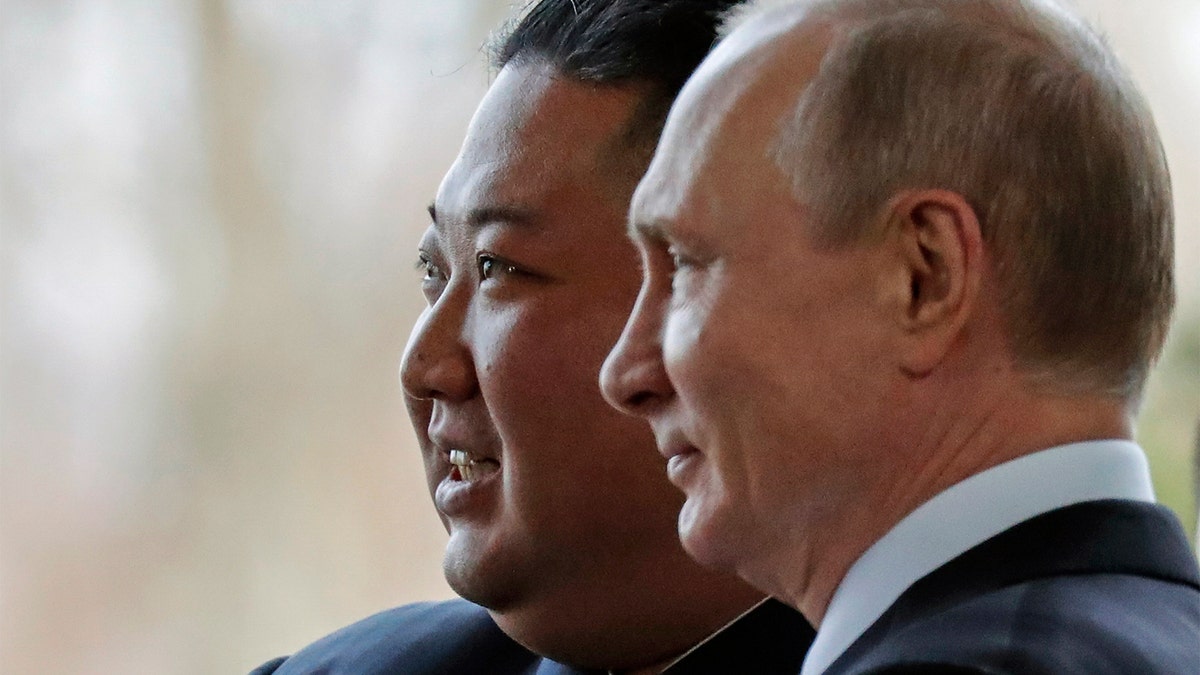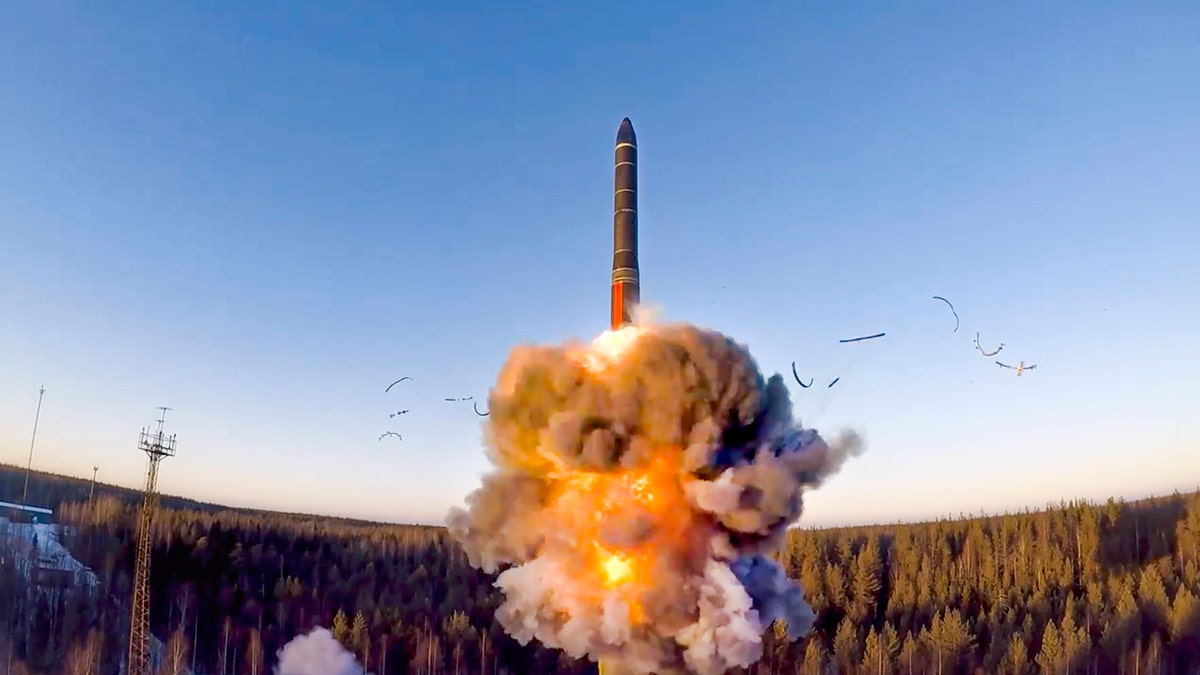Another North Korean missile test 'most likely' as Biden wraps Tokyo talks: Expert
Heritage Foundation Senior Fellow Brent Sadler expects North Korea to launch another missile test as President Biden finishes his visit to Japan.
On Sunday, North Korean President Kim Jong Un sent a "warm" message to Russian President Vladimir Putin congratulating him on Russia’s National Day, a holiday that marks Russia’s independence from the USSR, according to both countries' state news agencies.
The Korean leader expressed "full support" to the Russian president, the "friendly" Moscow government, and the Russian people, praising Putin for his "leadership and great success in carrying out the just cause of protecting justice and his country’s dignity and security," in an apparent reference to Russia’s invasion of Ukraine.

Following Russia's invasion of Ukraine, Putin and Kim Jong Un's relationship has become closer. (getty Images | istock)
Kim’s gesture on Sunday is the latest sign of a deepening relationship between the two countries, which view the United States as their mortal enemy and which both present a serious and deeply frightening nuclear threat to the United States.
The ties between Kim and Putin have been growing for the past several years, but since Moscow launched its military offensive against Ukraine, the relationship appears to be strengthening and has the potential to turn into a long-term partnership of a strategic nature. Both Russia and North Korea are under severe economic sanctions because of their disruptive geopolitical behavior.
RUSSIA MAY 9 VICTORY DAY: WHY IS THE DAY SO SIGNIFICANT TO PUTIN AND HIS AMBITIONS?

Russian Army soldiers stand in a military vehicle rolling during a dress rehearsal for the Victory Day military parade in Moscow, Russia, Saturday, May 7, 2022. (AP Photo/Alexander Zemlianichenko) (AP Photo/Alexander Zemlianichenko)
On May 9, Russia’s Victory Day, which marks USSR’s defeat of Nazi Germany, Kim also sent a congratulatory note to Putin expressing "decisive solidarity" with Russian efforts to eliminate "political and military threats and blackmail by hostile forces." This was most likely a reference to the West’s placing what is seen as "draconian economic sanctions" on Russia.
On May 26, Russia joined China in vetoing a U.S.-sponsored U.N. Security Council resolution proposing new sanctions on North Korea over its resumption of missile tests. Russia and North Korea are two of the key four state actors that present top security threats to the United States, a group that also includes China and Iran, according to the 2022 annual Threat Assessment by the DNI.
Both Russia and North Korea view nuclear use as a viable option to deter the United States from what Moscow and Pyongyang perceive as meddling with their domestic affairs in pursuit of their national interests. They each view the United States as their top threat. Both Kim and Putin have combative personal styles and seem to enjoy provoking Washington, as Moscow and Pyongyang seek to challenge U.S. global dominance.
RUSSIA STAGES NUCLEAR DRILLS AFTER US ANNOUNCES ROCKETS TO UKRAINE
Russia has a formidable nuclear arsenal, rivaling that of the United States. It has ratcheted up frequent nuclear threats amidst its brutal war on Ukraine, signaling its potential use if either the U.S. or NATO intervene as active combatants on behalf of Ukraine. It’s also quite probable that North Korea has some 45 nuclear warheads, according to Dr. Siegfried Hecker, a prominent U.S. expert on the country's nuclear program.

Russian President Vladimir Putin, right, and North Korea's leader Kim Jong Un pose for photographers during their meeting in Vladivostok, Russia, Thursday, April 25, 2019. (AP Photo/Alexander Zemlianichenko, Pool) (AP)
Pyongyang recently has stepped up its missile testing, having conducted 31 tests this year already, compared with eight in all of 2021. In May, North Korea launched a suspected intercontinental ballistic missile (ICBM), in addition to two shorter-range missiles, just hours after President Biden departed from South Korea.
On June 5, North Korea fired another eight short-range missiles, the most it has launched in a single day. Days later, the Biden administration warned that North Korea was capable of carrying out a seventh nuclear test "at any time."
In addition to increasing the pace of test missile launches, Kim’s forces broadened the variety of the missiles fired this year - short-range, intermediate-range, long-range missiles capable of reaching the continental United States, and tactical missiles—as well as submarine-launched, train-launched, hypersonic, and cruise missiles.
NORTH KOREA MAKING PREPARATIONS FOR POSSIBLE NUCLEAR TEST: OFFICIALS
According to RAND corporation, which assists the U.S. government with technical analysis, North Korea is on track to obtain 200 nuclear warheads within a few years, making it a mid-level nuclear power. Kim’s apparent decision to accelerate his nuclear program may have stemmed from his observation of the U.S. and NATO’s reluctance to engage militarily on behalf of Ukraine because of the fear of Russia’s employment of tactical nuclear weapons to thwart such Western intervention.
Kim’s ultimate goal is a robust nuclear weapons delivery system that can be mated with warheads that can target the U.S. homeland, with the intent of deterring the United States from ever attacking North Korea. His secondary objective is to demonstrate to South Korea and U.S. regional allies that Washington will face a tough choice of sacrificing one of its own cities if it decides to intervene against a North Korean attack.
Sharing a border with North Korea, Russia is not thrilled with Pyongyang becoming a nuclear state, but it understands that expecting Kim to abandon his nuclear ambitions is unrealistic.
The Biden administration appears to be ill-prepared to deter either of the highly risk-tolerant leaders from using nuclear weapons. U.S. warnings of a "swift and forceful response" in the event of an expected seventh nuclear test by Pyongyang, or if Russia uses atomic weapons in Ukraine are unlikely to change Putin’s and Kim’s plans and behavior.
The U.S.’s nuclear modernization appears to be behind what is required to protect the homeland from the North Korean nuclear threat. Air Force Gen. Glen Van Herck, the head of the U.S. Northern Combatant Command (USNORTHCOM), which is in charge of defending the U.S. and Canada from missile attacks, has warned that "going forward, I do believe that [the North Koreans] could exceed my capacity and capabilities." Meantime, Moscow has conducted nuclear mock-attacks on the U.S. homeland.

FILE - In this file photo taken from a video distributed by Russian Defense Ministry Press Service, on Wednesday, Dec. 9, 2020, a rocket launches from missile system as part of the drills, a ground-based intercontinental ballistic missile was launched from the Plesetsk facility in northwestern Russia. (Russian Defense Ministry Press Service via AP, File) (Russian Defense Ministry Handout via AP)
While neither Russia nor North Korea have actionable plans to attack the United States in a surprise "bolt out of the blue sky" strike, both envision employing nuclear weapons to deter the United States from attacking them, or if it intervenes directly on behalf of Ukraine and South Korea, in a regional conflict. Russia has already operationalized a limited nuclear warfare doctrine that envisions a detonation of a low-yield tactical nuclear warhead to signal to the U.S. and NATO its resolve to climb the escalation ladder to achieve its objectives on the battlefield. Recently North Korean officials also indicated a willingness to use small-sized tactical nuclear weapons, making the Putin-Kim partnership a grave concern.
GOOGLE SEES NEW TRICK IN RENEWED NORTH KOREA CYBER ATTACKS
In addition to posing a serious nuclear danger, Russia and North Korea have launched cyber-attacks on the United States and conduct cyber espionage. In recent years, Moscow has escalated cyberwarfare on U.S. soil, having struck various sectors of the economy and our critical infrastructure, including nuclear facilities, and the beating heart of the U.S. government: the White House, the State Department, and the Pentagon. North Korean cyber-crime has been "extensive and long-running," and the range of these crimes is "staggering," as described by government officials."
Russia has the most formidable foreign arsenal of cyber weapons. Although North Korean cyber tools are not as sophisticated, they are capable of inflicting serious damage. Consistent with Kim’s vision of cyber as "all-purpose sword," Pyongyang’s military intelligence hackers have conducted ransomware attacks, phishing campaigns, digital bank heists and money laundering operations. Putin and Kim will almost certainly use their growing relationship to challenge U.S. policies, especially since both feel that Washington is responsible for devastating damage to their economies because of sanctions.
CLICK HERE TO GET THE FOX NEWS APP
Moscow believes that the U.S. seeks Russia’s destruction and regime collapse, based on several statements from Biden administration officials who indicated that U.S. goals in the Ukraine conflict are to defeat Russia, degrade its military, and weaken its economy.
In his congratulatory message to Putin on Sunday, Kim expressed confidence that the relations between Russia and North Korea will only deepen, calling them "tactical-strategic collaboration" for the cause of defending global justice."
As the Russia-Ukraine war drags on, the danger from this combined nuclear and cyber threat is only likely to deepen.









































